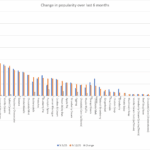
Keto Research Round-Up – September 2025

Research and studies continue to be published that contribute to the growing field of keto research. Here are some recent developments.
1. Keto Research About Major Depression

A recent paper in Frontiers in Nutrition presented the case report of a 47-year-old woman who experienced complete remission of decades-long major depressive disorder (MDD) within just 8 weeks of following a ketogenic diet (KD).
She described herself as “barely functioning”, with debilitating low mood and fatigue, and struggling to handle everyday tasks and maintain basic self-care. Prior to trying keto, she had followed a vegan diet for 15 years, which induced iron deficiency anemia. Neither iron supplements nor switching to a Mediterranean diet had any impact on her energy levels or mood. She experienced “only limited benefits” from psychotherapy and she had to discontinue antidepressant medication owing to unacceptable side-effects.
She followed a protocol designed by her psychotherapist and a keto nutritionist, which was a pescatarian keto diet plus virtual support from the two professionals, as well as an array of supplements, including a methylated B-complex, trace minerals, fish oil, and acetyl-L carnitine.
Within only two months, validated clinical assessments of depression showed that the subject went from severe depression to no depression, and she reported experiencing “relief from the pervasive sadness and emotional dysregulation she had experienced in depressive episodes.”
2. Keto for Obsessive-Compulsive Disorder

Two recent papers demonstrate the efficacy of keto diets for obsessive-compulsive disorder (OCD). The first, published in Frontiers in Psychiatry, covers a 37-year-old woman who started a KD to address her anxiety, depression, 25-year history of OCD, and weight loss.) In addition to OCD, she also had psoriasis, Hashimoto’s disease, atopic dermatitis, and ulcerative colitis (UC).
Multiple medications and cognitive behavioral therapy (CBT) had failed to resolve her mental health issues, but her depression lifted within 9 weeks of starting keto and her OCD was in complete remission within 12 weeks. She also lost 21 pounds during those 12 weeks. Not only that, but her psoriatic plaques cleared and the UC was in clinical remission within only 3 weeks. (This adds to the growing body of research showing that KDs can help to put UC, Crohn’s disease, and other forms of irritable bowel disease into remission.)
The second paper covers three patients who experienced complete remission of OCD using a keto diet. All three subjects had tried either CBT or multiple medications, with only limited relief for their severe symptoms. Unlike the failed therapy and medications, keto diets decreased their symptom scores by an average of 90 percent. Moreover, for all three subjects, when they strayed from the diet, their symptoms returned, but resolved again when they went back to strict keto.
In one patient’s words:
“Before eliminating sugars and grains from my diet, the best way to describe me was hollow, a shell of a person who could not fully engage in life. I feel like I missed the best part of my children’s young lives, sedated and overwhelmed by my thoughts. Now, I enjoy the person I am today—alive, active, and determined not to miss another second.”
Patient 3, a 47-year-old female
3. Keto for Schizoaffective Disorder

Schizoaffective disorder is another condition for which keto has been shown to have profound benefits, even when psychotherapy and multiple medications had little impact. A case series published in Frontiers in Nutrition reported on two subjects who experienced remission of psychotic symptoms associated with schizoaffective disorder through following a KD.
The first subject implemented a KD with added supplements, and blood glucose and ketones were measured daily to monitor compliance. Within 6 weeks of implementing the diet and supplement protocol, the subject reported complete resolution of suicidal ideation, depression, anxiety, and hallucinations. By the 24-week follow-up, she had discontinued all medications except fluoxetine (Prozac), which she was actively tapering under provider guidance.
The second subject had a similarly remarkable experience, with improvements in self-reported metrics as well as improvements in scores in clinically validated measures of anxiety and depression. According to the paper, she “achieved full remission of chronic psychotic and mood symptoms by 6 months.”
Reflecting on her experience using ketogenic metabolic therapy, subject 2 said:
“It’s hard to think about how my life may have played out differently had I been offered this intervention earlier in the course of navigating my illness. I absolutely wish ketogenic therapy and metabolic therapies would have been shared with me as a viable option as early as possible.”
4. Myths and Facts About Low-Carb Diets

There are lots of myths and misunderstandings about keto diets. These incorrect assumptions lead some medical professionals to warn patients against keto and stand in the way of people implementing a nutritional strategy that can have a profound beneficial impact on metabolic and mental health. Fortunately, a paper in the journal Nutrients separates myths from facts and sets the record straight about this potentially lifechanging way of eating. The paper addresses several points that are often contentious regarding keto, such as the potential risks to cardiovascular health, kidney function, and gut health, as well as the issues of affordability and environmental sustainability.
The authors make the case that—contrary to commonly held beliefs—low-carb diets can actually be beneficial for kidney function and cardiovascular health. As for digestive function, ketogenic diets have been shown to improve gastroesophageal reflux disease (GERD) and even put ulcerative colitis and Crohn’s disease into remission.
The Nutrients paper also presents evidence that low-carb diets are not elitist, nor available only to wealthy people. (Need tips for doing keto on a budget? Download the free Low-Carb for Any Budget e-book. It includes shopping lists for discount chains and dollar stores!)
Additionally, while keto diets tend to rely heavily on animal foods, it’s possible to do vegetarian or pescatarian keto. But for those who prefer to consume more red meat, pork or poultry, and who have concerns about the environmental impact of animal agriculture, the paper also addresses those issues.
Looking for More Keto Studies?
View our roundup of recent keto research from earlier this year.




